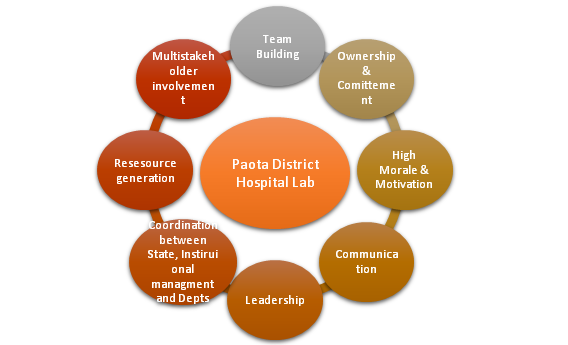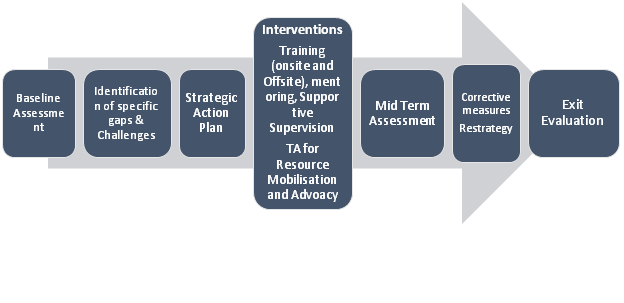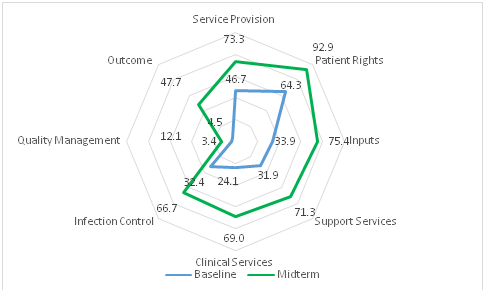Background
Laboratory services play a crucial role in health care service provision as they help determine the presence, extent of disease and monitor the effectiveness of treatment. Around 70 percent of all clinical decisions are based on laboratory test results. Laboratory improvement in public health is thus the need of the hour.
Laboratory Quality Management Systems have been found to be the best mechanism for addressing this need for laboratory improvement. The International standard ISO 15189 gives direction for establishing robust laboratory QMS. However, will and volition as well as skilled workforce are paramount to such a process
The Labs for Life Project(L4L) is a pilot partnership initiative between Ministry of Health and Family Welfare (MoHFW), the U.S. Centers for Disease Control and Prevention (CDC), BD and Christian Medical Association of India(CMAI). The key objectives are to improve the quality, effectiveness, and efficiency of public health laboratories under MOHFW. Through this collaborative effort, technical assistance for developing laboratory QMS is being provided to 20 public health institutions (both secondary and tertiary) covering 10 districts from 6 states representing all 5 national regions (North, South, East, West and North East) of the country.
The project adopts a systematic multi-dimensional technical approach to ensure quality management systems in the identified public health laboratories, in line with the ISO 15189 standard, the International Standard for Quality and Competence for Medical Laboratories.Quality system requirements like safe sample collection, equipment management, facility management&safety, documentation, instituting error detection mechanisms through quality controls, staff training& development,non-conforming event management, assessments and evaluations are being addressed through the project. In addition to technical support, resource mobilization and advocacy are also important aspects of the project activity.
A system of assessment, capacity building and reassessment as suggested by NHM is being adopted. Checklist 13 for Laboratories, of the National Quality Assurance Standard (NQAS) has been employed in the process of assessment. MoH assigned a star grading to the scores elicited by the checklist. The recently conducted midterm assessment using the tool indicated a significant quality improvement in the functioning of participating laboratories
Objectives
The objective of the paper is to present the outcome of the interactions between the Paota District Hospital Laboratoryin the Jodhpur district of Rajasthan State and Labs for Life Project, where commitment of the state health system and technical assistance of the project converged to produce outstanding changes.
Methods
The experience of PaotaDistrict hospital laboratory in implementing its Laboratory Quality Management System under the guidance of the Labs for Life Project was documented as a case study. In addition to the secondary data analysis, interviews and group discussions were conducted among the laboratory staff of the institution, administrative and technical heads of the institution and project staff to understand the facilitating factors and challenges for the progress of the project.
About Paota and the District hospital:Paota is small town located in the Jodhpur district of Rajasthan with a population of 15,473 (census, 2011). Paota town has higher literacy rate compared to the rest of Rajasthan. Though the town has several smaller and medium level private health care facilities, the district hospital, the District Hospital Paota is one of the major facilities, with 150 beds, rendering secondary level health care services including trauma care. The hospital is not only catering to services to the population in the town, but also covering a radius of around 25 km around the town. The hospital has a total number of 135 staff including 30 Doctors, 60 Nurses, and 8 laboratory staff. The average outpatients are about800 patients per day. Lab load per day averages 500 tests. The laboratory provides 52 tests out of 56 test as per MNJY scheme.
ProjectActivities and the Improvement Process
The Role of the State and Institutional Support System:
Before the commencement of Labs for Life project (L4L), the lab services in the Paota District hospital was perceived just as a routine support service, not as a core clinical activity that has a huge influence on the patient outcome. Consequently, insufficient attention was given to the quality of laboratory services, in spite of having adequate equipment and supplies.
The critical aspect of the project is the institution’s ability to adapt and respond to changing requirements and accepting the additional responsibilities towards achieving quality laboratory services. The uptake of the training and skilling efforts was remarkableThe commitment of the statehealth authorities, top management of the institution, technical supervisory staff and the frontline lab workers optimized the Technical Assistance offered by the Labs for Life teamThis highly effective team,where the members value each other and can rely on each other to help recognize and address issues and problems arising in the laboratory gave the momentum and expediency to the improvement process. There were regular interaction and communication with the staff, hospital management and the L4L project team at the local and national levels. Considering the importance, the top management was very quick in providing the required support for laboratory improvement. In few instances, when funding became a constraint, the institution was able to mobilize resources from NGOs and other sources to complete the work in time. Moreover, the hospital involved all the relevant stakeholders including the community (patients), civil society organizations, government officials etc., to the maximum possible extent through appropriate mechanisms. Above all, the very high level of motivation and morale of the employees are crucial factors that added immense value to the quality improvement process in the laboratory.

The Role of Labs for Life (L4L),the Technical Assistance:
The Labs for Life started its engagement withPaota District Hospital in the month of February 2015, with the specific objectives of improving the quality of services by at least two additional stars/grades/levels as measured by the checklist. Strengthening of specimen referral mechanism and linkages between various levels of facilities, enhancing capacity for diagnosis of communicable and non-communicable diseases and ensuring sustainability of interventions through local, state-level and country ownership are also objectives. The strategic process flow of the project is depicted in Figure -1.

The baseline situation analysis
conducted in March 2015, followed by the joint report writing was the turning point that provided the positive attitude to the hospital management and employees towards improving the quality of laboratory services. The baseline assessment revealed the gaps and challenges in terms of Service provision, Patient rights, Inputs, Support services, Clinical Services, Infection Control, Quality Management and Outcome measurement. The laboratory scored an overall score of 27.2% which was one of the lowest among all the selected district hospitals. Essentially, the baseline situation analysis brought out the gaps in terms of technical knowledge and skills; attitude and motivation; vertical and horizontal coordination, leadership; teamwork and collaboration; communication and advocacy
Strategic Action Plan:
After the baseline assessment and joint report writing, the first step was to develop astrategic action planwith timeline, in consultation with all the stakeholders including the state health authorities, hospital management, laboratory staff and Labs for Life staff. The gaps were mutually understood and activities were finalized in consultation and consent
Inputs and Processes - Implementation:
The Labs for Life project focused mainly on thetechnical capacity building, resource mobilization and advocacy. The capacity building & skilling of workforce through onsite and offsite trainings, mentoring, supportive supervision and e-learning through Webinars was the mainstay of the project. These included technical areas of developing quality management system. The areas of training covered so far are; Sample collection, equipment management, facility management& safety, documentation, non-conforming event management, assessments & evaluations, quality controls etc. Additionally Internal Auditor’s training in ISO 15189, the international standard for quality and competence was provided. The technical assistance for resource mobilization included Program Implementation Plans (PIPs)and training in PIP development, to mobilize resources from NHM, State funds, etc. Advocacy component included sensitization of the state and district level health authorities, and institution and department heads.
The Effectiveness/Outcome
- It is evident from the midterm assessment conducted in October 2016that there is a significant improvement in the overall functioning of the laboratory. The significant increase in the overall score from baseline score of 27.2% to 59.7% at midterm clearly indicates the effectiveness of the program (119% increase). Besides, a significant increase was found in all the technical components (Figure 3).
Figure 3: Outcome

- Significant improvement in the technical knowledge, practical skills and attitude among the laboratory personnel.
- The quality component has gone up significantly since the midterm review. The PIP FY 16-17 money was just becoming available at the time of the midterm review. Currently IQC and EQAS have been instituted. LIS is under progress.
- The lab is being taken up for NABL accreditation this year.
- There has been a gradual increase in the number of laboratory investigation carried in the laboratory during the last two years.All socio-economic classes of the population (lower, middle and upper class) prefer to get lab investigation done from this hospital.
- The expedient team building byPaota DH, an activity spearheaded by the PMO, followed bycommendable teamwork, provided the drive for the improvement process.
- This state and institute is very successful in mobilizing resources.Rajasthan received the maximum PIP allocation from NHMout of all states that Labs for Life facilitated PIPs for. Additional resources have been availedfrom non-government sources by the institution.
Cost Effectiveness/ Scalability/ Sustainability
- Cost-effective service provision:In DH Paota, the numbers of investigations, volume, and quality of services have been enhanced without much additional investment, by ensuring effective resource utilization and by tapping into available funds.
- Scalability:
- It has been internationally accepted that implementation of QMS will enhance performance of labs. The ISO standard directs labs to this. The project has attempted creating an ISO based QMS structure. As all labs in India can benefit from adopting this model, the NHM is currently rolling out a National Initiative towards ISO based QMS development in all public health labs.
- The case study points towards the importance of sensitization of all levels of healthcare providers towards the laboratory improvement processes.
- Motivational mechanisms, wherever required, are very important.
- Sustainability:The method is directed towards enhancing available mechanisms to create robust quality management systems. A well-documented QMS will take the emphasis off individuals and place it on systems, the best way to ensure continuity and sustainability. Many quality system elements like safe sample collection, documentation, equipment management, Quality Controls have been created in Paota.The resources developed by the project are being made available as free resource online. Instructional videos for standard testing practices and quality systems are also being made available.
Lessons Learned
- Attitude, willingness to adapt to advances in Laboratory Medicine, assume extra responsibilites towards this, commitment to work, motivation and morale of healthcare workforce are very critical elements that make positive changes in health systems.
- Team building,where the members value each other and can rely on each other to help recognize and address issues, is vital.
- Skilling of workforce in a laboratory contributes to efficient and effective laboratory performance. The overall approach of Training- Mentoring-Advocacy is found to be an effective mechanism for establishing quality management systems for the improvement of Public Health Laboratory Systems.





